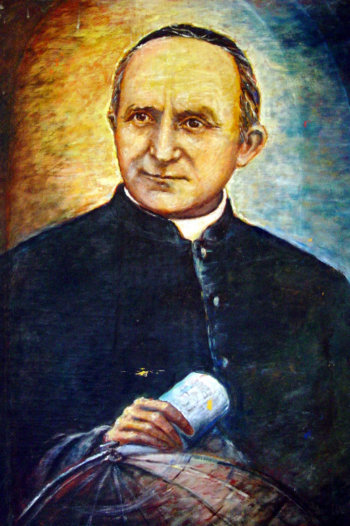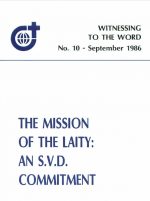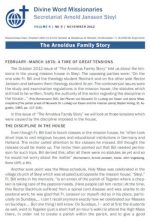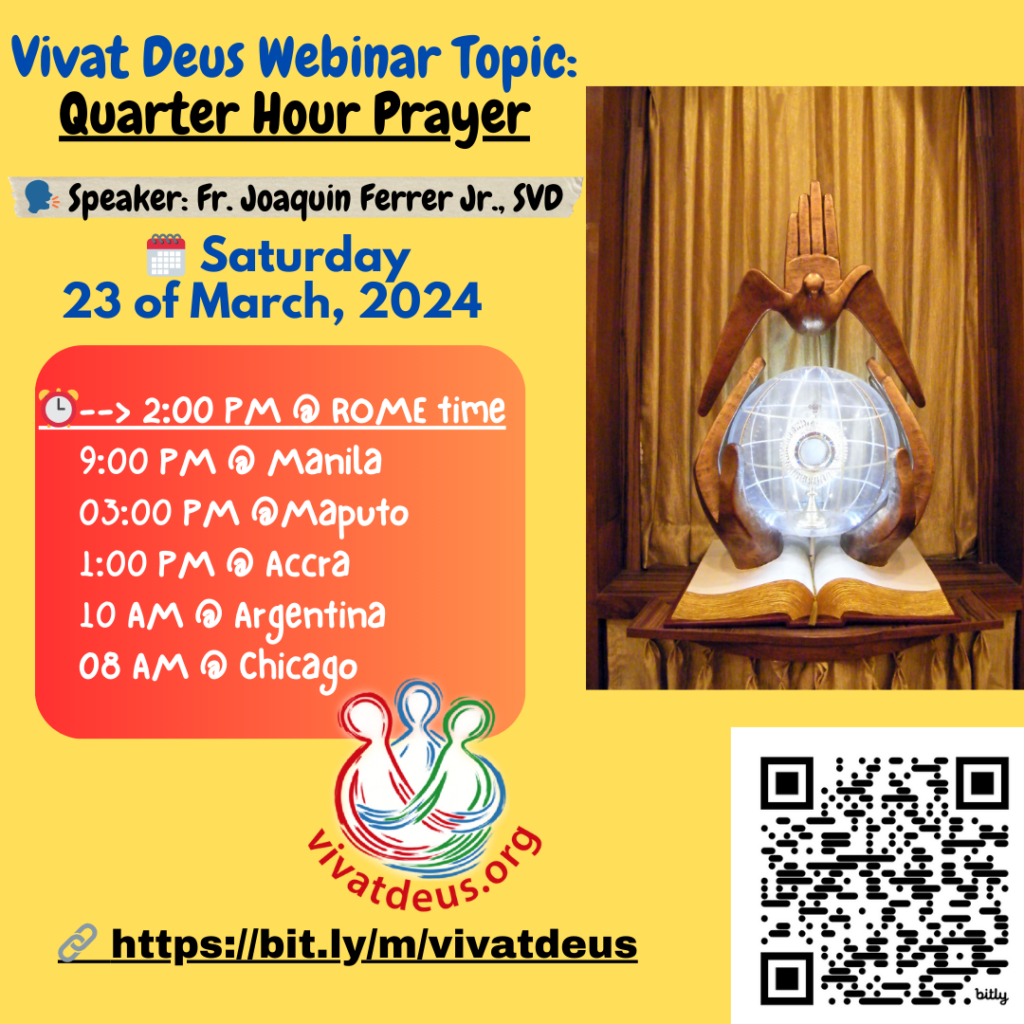After having talked about evangelization and communication in a general way we now begin going back to our roots. And that means in the first place to Fr. Arnold.
Fr. Arnold lived mainly in the 19th century and the beginning 20th century. It was the time of flourishing missionary work on the side of Catholics and perhaps more yet on the side of Protestants. And it was also the time of European colonialism, and so it comes as no surprise that there was a close connection between colonialism and mission- also with Fr. Arnold. But so much I can say already now that for Fr. Arnold there was no way around working with the German government’s colonial aspirations, otherwise he would not have been able to send any missionaries to the so-called “pagan”, that means non-Christian countries. That’s a fact. The same was true for all other mission congregations as well, who operated from countries which had colonies, for instance the French.
In this presentation I will talk about Fr. Arnold’s understanding of mission which actually meant: being sent to do evangelization, that is preach the Gospel of Jesus Christ and that means: work for the kingdom of God. And here we see that Fr. Arnold had a very broad concept of mission or as we say today: evangelisation; actually we must say: he began with one and developed it in the sense he expanded it so that in the end of his life it looks very much like our modern understanding or mission and evangelization.
In this talk I will show the development. Yet before I do that, by way of introduction I will quickly present the idea of mission, evangelization German Catholics had at his time. And the first major part of my presentation is to talk shortly about the roots of his understanding of mission and evangelization: the French Jesuit Apostleship of Prayer.
INTRODUCTION:
THE GERMAN CATHOLIC UNDERSTANDING OF MISSION IN THE 19th AND BEGINNING of 20th CENTURY
Catholics in Germany used the word “mission” in different ways:
-Mission = Northern Mission
After the reformation the Protestant territories in Northern Germany in which there were only a few Catholics living and the mainly Protestant Scandinavian countries were called “Northern Missions”. They were under the Sacred Congregation of the Propagation of Faith in Rom.
In 1668 the “Apostolic Vicariate for the Northern Missions” was founded. The communities in the Apostolic Vicariate were called “missions” or “mission stations”. The priests, mainly religious, were called “missionaries”, the teachers in Catholic schools “mission teachers.”.
One of the first SSpS was actually a mission teacher in the Northern Missions prior to her coming to Steyl: Adolphine Tönnis, later Mother Mary Michaele, Co-foundress of the Pink Sisters.
The first task of the missionaries in the Northern Mission was to care for the few Catholics in that area.
– Mission = mission amongst non-Catholic Christians.
Catholics considered it their right to convert non-Catholic Christians to the Catholic Church.
– Mission = interior mission / mission within
This kind of mission had as its objective the renewal of the faith and life of Catholic Christians.
– Mission = pastoral care of the migrants, particularly in America.
The Propaganda saw Northern America as its own mission area.
– Mission = mission amongst non-Christians (“foreign missions”)
The missionaries
We distinguish here missionaries proper and mission helpers. Missionaries proper were according to Catholic understanding until Vatican II the ordained missionary priests who have been sent and who are theologically prepared. The reason for that is that they alone can be considered the proper preachers of the gospel and administrators of the sacred mysteries, for they alone possess the teaching, priestly and governing power which is necessarily connected with the missionary vocation.
Mission helpers, that is missionaries in the wider sense of the word, were in the former understanding the Brothers and Sisters as well as lay people who work side by side with the priests.
A. THE ROOTS OF FR. ARNOLDS UNDERSTANDING OF MISSION
THE APOSTLESHIP OF PRAYER AND ITS UNDERSTANDING OF MISSION
I: The importance of the Apostleship for Fr. Arnold
In 1861 Arnold Janssen had been ordained a priest and from then on he worked as priest and teacher at the Bocholt Junior Secondary High.
In 1865 he got to know the Apostleship of Prayer which had been founded by Jesuits in France. In 1866 he became promoter and later the Director of the Apostolate in the Diocese of Münster. His membership in this Apostolate influenced him deeply. His first biographer, Fr. H. Fischer writes:
There can be no doubt that, besides the grace of God, the introduction of Arnold Janssen to the Apostolate of Prayer and its spirit was responsible for his wide outlook. His strong minded and generous surrender to the “Will of Jesus”, as he put it”, and his espousal[support] of the spread of the kingdom of God on earth, the winning back of separated Christians, and the salvation of the non Christians – all of these – laid the foundation for the birth of the Steyl mission work. The last forty years of his life arose out of the fire of this apostolic love (H. Fischer, You are the temple of the Holy Spirit, p. 12).
II. The Apostleship’s understanding of Mission
Our source here now is the book by its general director at the time of Fr. Arnold, Fr. Ramiere SJ: The Apostleship of Prayer. A Holy League of Christian Hearts united with the Heart of Jesus, to obtain the triumph of the church and the salvation of souls
As this title (also the name of the Apostleship) says: the Apostleship is an apostleship of prayer. Every baptized person should be a missionary by praying in community, for according to Jesus’ promise “where two or three hearts are together in my name I am with them”, his heart will join their hearts, and bring the prayers of the community to the Father, and so those prayers will be successful. People should pray that the mission of the church is successful, for according to 1 Tim 2:1-6 God wants all people to be saved and he wants us to pray for it.
The mission of the church according to the Apostleship can be summarized, for instance, in this way:
Mission means: to save people because God loves them and wants them to be saved.
To be a missionary means to be God’s co-worker through communitarian prayer in carrying out his will to save people through people.
Mission is a work of loving one’s neighbour. Yes, it is the highest work of this love – for what is more important than the eternal salvation of people?
Another very important scripture passage for the Apostleship and for Fr. Arnold is Philippians 2:5 “Let the same mind be in you that was in Christ Jesus.”
The life of Jesus was a truly apostolic life. To live an apostolic life meant for Jesus to work for the honor of God and for the salvation of people. Both things coincide and cannot be separated.
If we want to follow him perfectly, we have only one means to do that: like him we must desire the salvation of all peoples and for that intention we must pray, work and suffer…”
Mission also means: to be of one mind with Jesus and to make the wishes and intentions of Jesus our own, and that means: to pray, work and suffer for the honor of God and the salvation of souls.
The Apostleship of prayer wants to achieve the honor of God, the salvation of souls and also the triumph of the Church. The Church will triumph when she carries out the church’s mission successfully. And that mission is:
“to build up the kingdom of God, to sanctify souls, to lead the unbelievers to the knowledge of the truth and sinners to the life of grace, to unite all the children of God who at this hour are split into thousands of fighting sects and hostile groupings.
With this understanding of mission, which has its roots in the Apostleship of Prayer, Fr. Arnold began the Steyl Mission Organisation.
B. FR. ARNOLD’S UNDERSTANDING OF MISSION / EVANGELIZATION
When we now study Fr. Arnold’s understanding of mission we will get a big surprise: it was not a static one but one which was changing, getting broader according to the signs or demands of the times. At the beginning of his understanding was Mission Ad Gentes, or commonly called pagan / foreign missions.
I. MISSION TO THE NON-CHRISTIANS – AD GENTES
1. According to the 1875 / 1876 formulas of consecration
a. The 1875 consecration to the mission work of the new mission house
‘June 16, 1875 was the day on which the [mission] house [in Steyl] was definitely bought. For Christianity that day was the two-hundredth anniversary of our divine Savior’s apparition to blessed Margaret Alacoque when he demanded the institution of the feast of his most sacred heart. In remembrance of this day the Holy Father, Pope Pius IX, had given indulgences to a prayer of consecration to the most sacred heart.
Together with many Catholics on that day Fr. Arnold in Kempen and his first co-workers, Fr. Bill in Luxemburg and seminarian John Baptist Anzer in Bavaria, consecrated themselves also to the most sacred heart, using the above mentioned prayer. To that prayer they then added another one: a prayer of consecration to the Sacred Heart regarding the mission work of the new mission house which still had to be founded. Later that prayer was changed a bit and got the wording with which during the first years of the mission house the vows were made (Auf der Heide, Die Missionsgesellschaft von Steyl (The Mission Society of Steyl), Ein Bild der ersten 25 Jahre ihres Bestehens (a picture of the first 25 years of its existence), Steyl 1900, p. 34).
This prayer reads:
With regard to the fervent wishes of Your Most Sacred Heart, which in such special way are directed towards the spread of Your holy Kingdom upon earth, I, Prostrated before You, my creator, redeemer and sustainer, Make my poor person available to Your divine Heart with regard to the mission work of your holy Church, insofar participation in it is being striven for in this house.
The consecration concluded with the words:
May the light of the divine Word shine into the darkness of sin and the night of paganism, and may the Heart of Jesus live in the hearts of people (ibid., p. 37).
If we asked the question: where on earth did Fr. Arnold and his companions want to do missionary work? then the answer would have to be: wherever there is the night of paganism there they wanted to spread the light of God’s kingdom.
b. The understanding of mission in the 1876 formula of consecration
A year later two of Fr. Arnold’s first companions had left Steyl, Fr. Bill and seminarian Reichert.
On June 16, 1876, exactly one year after the first one, Fr. Arnold and seminarian John Baptist Anzer consecrated themselves a second time to the Sacred Heart and the mission work of the new mission house and this time for life. They prayed (my translation of the Latin original):
“Already truly prostrated before your face, for the increase of your honor and for the greater spread of your kingdom upon earth, in honor of the most sacred heart of Jesus and for the salvation of all souls we promise you the following:
The wishes of your most holy son are mine and I will work insofar it is possible so that your holy gospel will be spread upon earth – Your holy gospel Which saves, illumines and vivifies the souls,
Which destroys the kingdom of your enemy, the devil, particularly amongst those pagan peoples who do not yet know you as the redeemer of all who loves them so much, and who shed Your most precious blood for all.
I want to be a servant of the Divine Word in the service of the king and queen of angels.
And since you want that people are being led to you through people, And since – Because of the arrogance of fallen man – You instituted obedience towards the superiors as the most reliable interpreter of your will and as the way to full salvation, So with a free heart I promise forever obedience….
Everything I do is to serve the Divine Word for the spread of his word; my tongue is to serve Your divine Word, and through my small service – with the help of all the angels and saints – may the heart of Jesus live in the hearts of all people. Amen.’
Then the following words were being added:
And in order that we consecrate ourselves to you still more perfectly
And that we don’t retain anything of us,
We promise you also the following:
I give you all my prayers, my works and my pains,
that means their intercessory power
for the fulfillment of the wishes of the most sacred Heart of Jesus
particularly (praecipue) in the countries of the pagans,
in union with all who are united with one another in the Apostleship of Prayer’ (Arnold Janssen Archives in the Generalate SVD, nos. 3720-3721).
Similar to the 1875 consecration formula so this one is being concluded with the words:
The light of the sweet Divine Word may shine into the darkness of sin and the night of paganism.
Again, mission is mission to the pagans – but NOT EXCLUSIVELY, only PARTICULARLY.
This formulation leaves the mission open to other possibilities.
2. According to the Little Messenger of the Sacred Heart of Jesus
a. Switch from home to foreign missions
In 1874 Fr. Arnold launched his own mission magazine, the LITTLE MESSENGER OF THE SACRED HEART OF JESUS (KLEINER HERZ-JESU-BOTE)
In the first issue Fr. Arnold said that the new magazine was promoting the mission at home and foreign missions. The mission at home will have been the Northern Mission.
But already the second issue said:
The Little Messenger of the Sacred Heart will seek to arouse MAINLY the interest for the foreign missions amongst the pagans.
Why this change in emphasis? Fr. Arnold explains:
As we are to give our attention to the missionary work of the church in Germany, so not to a lesser extent but perhaps to a much higher extent we have to give our attention to the missionary work of the church in pagan countries, and now he gives the reason: particularly during the present difficult times. With God’s permission now so many German priests are driven to foreign countries. And on the other hand they cannot find a new quiet employment in the main area of the St. Boniface association (Northern Mission). All of this is God’s hint for us Germans. For in comparison with France we have been doing so little to carry out the Lord’s word with regard to the preaching of the faith: Go into all the world (p. 17).
It was the time of the cultural war which made it impossible for many priests to do their priestly work. As a result, in Prussia 1000 parishes were without a priest. That these priests were not able to work in Prussia was for Fr. Arnold God’s way of telling the Germans: don’t only think of mission within Germany, but think of the spread of the faith amongst non-Christians overseas. In obedience to this, Fr. Arnold concentrated his work on the foreign missions in the pagan countries – on the spread of the faith amongst non-Christians. “This is the first and highest goal of the church on earth. To this exalted work our little magazine is dedicated. We hope to channel more prayers and donations to this mission work. We hope to awaken here and there a slumbering missionary vocation. Furthermore we hope, here and there to make some Christian mothers pray and implore God to let their son become a missionary. Finally we hope that the story of the heroic examples of virtue the missionaries and their companions give will be of use also to our own contemporaries who generally are bit weak and lazy, so that here and there it will become a bit more lively with regard to the practice of religion (cf. p. 17).
It is THE SIGNS OF THE TIMES, the situation of the Kulturkampf in Prussia which makes Fr. Arnold see in the pagan mission that kind activity God wants now and then.
b. Fr. Arnolds wider understanding of the missionary
In the first place he like Catholics generally thought that priests were to be the missionaries proper. But again, because of the signs of the times, the Kulturkampf, he got a wider understanding:
He needed to sell his mission magazines; so he needed people who helped him advertise it; he felt that the editors of Catholic newspapers could do that by copying mission articles free of charge in their papers. So he wrote to the editors of Catholic magazines and newspapers, pointing out their missionary obligation:
It would please us very much if the editorial offices of the political papers once in a while published a mission article. We here mean in particular stories from life in the missions which are of general interest and which do not just cause a passing sensation, but which are truly useful to the reader, by inspiring and strengthening him religiously.
At this time most readers would accept such articles gratefully. Furthermore, right now we live in a time in which it is very important to lift us up and strengthen us interiorly. And to this Catholic newspaper editorial offices must cooperate since they are missionaries called by God.
There are many people who read nothing else but their newspaper. Therefore, besides the necessary political news they must not be deprived of good religious sources. …
At present everybody speaks about religion. To do religious politics has became the main occupation of our political parliamentary chambers. Therefore why this frightened excuse: We are a political and not a religious paper. At present we consider that kind of political paper a miserable paper which does not have a good number of religious contributions and which seeks to nourish religion amongst its readers.
We live at a time where everybody in his state of life must become a missionary. From this, in particular, we must not exclude the editors of political newspapers with their far reaching influence.
The inner deepening and strengthening of our faith, that must be the goal of everybody in the light of the imminent difficult times and dangers.
According to the importance which God places on the inner life in particular, just this inner improvement is in the opinion of many the secret intention with the present difficult times.
For this reason, presently the spread of inspiring magazines is particularly important. And not only that. Also the generally such well intentioned editorial offices of Catholic newspapers, which have gained so much merit in religious regard, have to still add that they strive for even more.
Let us think only of those well spoken words of a Catholic member of parliament which he said publicaly …
The Catholic Church has a powerful castle in the hearts of the catholics, that is in their love for the Catholic faith.
You must do your part to make this castle insurmountable and let us here not forget, that just missionary stories are most suitable to fill us with love for our holy faith.“
3. Mission in the German Colonies
a. Evangelization and colonialism: making hard working, peaceful Christians
The main, but not exclusive task of St. Michael’s mission house was to work for the pagan missions. In order to send missionaries there Fr. Arnold had to go through the German colonial office.
The German government wanted only German missionaries for the German colonies. In order to get permission to work in the German colonies and to start in Germany mission houses to train German missionaries for the German colonies, Fr. Arnold had to speak the colonial language. So he wrote for instance:
We will do all we can and work indefatigably to make the people (living in the colonies) hardworking and peaceful good Christians.
For Fr. Arnold, the propagation of the faith, evangelization, surely was the first goal, but in order to achieve it he also had to say that the missionaries would make good, peaceful and hardworking people in the colonies.
b. Evangelization with respect for the traditional beliefs of people
In connection with the work of his missionaries in Togo Fr. Arnold made a remark which is most interesting from the point of view of his understanding of mission.
To the Apostolic Pro-Prefect of Togo, Fr. Schäfer, he wrote regarding the removal of a fetish by Fr. Dier:
“To be sure, St. Boniface had the Donar Oak near Goslar cut down and his success proved that in the circumstances he could take such a liberty. But as a rule missionaries may not do such things. Even St. Francis Xavier did not burn the idolatrous pictures himself; he got the children (of the idol worshippers) to do it. Anyway, idol worshippers have their own will which should not be taken from them, because God himself leaves it to them and does not wish to convert them by force” (Alt, Journey in faith, p.641).
This remark tells us something important about Fr. Arnold’s understanding of mission:
Mission / Evangelization does not mean that the missionary was allowed to destroy non- Christian religious objects.
Mission / Evangelization rather means respect for the people to whom such objects are sacred and for their free will which even God respects.
C MISSION AS STRENGTHENING CHRISTIANS WHO WERE IN DANGER OF LOSING THEIR CATHOLIC FAITH
I. Mission in Latin America
Again it was the signs of the times that made Fr. Arnold change his concept of mission by broadening it and including the strengthening of Catholics who were in danger of losing their faith.
In the 19th century the pastoral situation in Latin America was bad. For there were just too few priests and religious for the many Catholics there.
At this time Latin America had been the goal of many migrants, Germans and German speaking Russians included. The situation of these people moved Fr. Arnold very much. For they were in grave danger of losing their faith soon as the example of Catholic migrants to the USA had shown.
Fr. Arnold had to justify to his general councillors his broadening of the missionary work of his congregation: And he did so in this way:
In his personal notes from 1906 he wrote under no. 34:
“Furthermore, there are so many Catholic countries which have fallen into neo-paganism. Since we cannot work everywhere, we have to see 1. where work is most necessary, 2. where we can reap most fruits.To the latter ones certainly belong … Brazil, Argentina and Chile (Arnold Janssen, Persönliche Aufzeichnungen (personal notes) from 1906, p. 45).
In no. 37 Fr. Arnold writes:
May, therefore, nobody despise work in Catholic countries, particularly in those in which the faith of the people has declined. Here we are dealing with baptised Christians who therefore have a certain preference over others, even though the pagans because of our constitutions have the first claim to our help (ibid. p. 47).
Why do baptised Christians have a preference over others, for instance over the pagans? The answer to this question we find in a letter of Fr. Arnold to Fr. Limbrock in New Guinea:
“From a people to whom the gospel has not yet been preached the Lord God demands only the observation of the natural moral law. If, however, the gospel has been preached to a people, it will become more culpable once it falls back into paganism. For that reason you have a great duty that there where you have begun, you continue and complete what you have begun”.
II. Mission in the USA THIS PARAGRAPH IS NEW
In his personal notes from 1906 Fr. Arnold wrote about the work in the USA:
“In order to get a foothold in Northern America we had to make the decision to establish a school for young tradesmen. It is my wish that an association of good master craftsmen will grow out of it and that in this way we take good care of this important class of people. Finding good workplaces for the apprentices who come from our schools is reason enough to work for them. To this class of people we must give St. Joseph as a model; as soon as we can we must do our best to form their members into pious Catholic Christians. As time goes on I hope for good results and I wish that our priests will then take care of the tradesmen and workers in other places as well” (Arnold Janssen, Persönliche Aufzeichnungen – Personal Notes, p. 46).
For you sisters your first independent apostolate in Techny was the old age home where your sisters were able to lead many old people back to the faith.
In 1905/1906 the apostolate among African Americans was begun by the SVD and SSpS.
It was a school apostolate particularly done most successfully by your Sisters.
A good summary of this broadening understanding of mission /evangelization is the rule of 1905.
III. Mission / Evangelization according to the rule of 1905 – approved by Rome
A very interesting and modern sounding understanding of mission/evangelization we find in the constitutions of 1905 which were approved by Rome ad experimentum for five years.
In Part I of the Constitutions we read about the nature of the society, about admission to her and life in her.
Chapter I, no. 5 distinguishes a twofold purpose of the society:
‘The first purpose is to work for the sanctification of all the members of the society through the observance of the three vows and the constitutions (hic erit finis primarius Societatis).
The second purpose is for the confreres to work for the conversion of the pagans, the heretics (Protestants) and unbelievers, et hic erit finis secundarius – this will be the second purpose. But here our greatest care we give to the conversion of the pagans, so that the Christian faith may enlighten those vast regions where the cult of idols still keeps so many people in the bondage of the demons.’
‘Besides this second purpose there may also be other secondary purposes (fines secundarii) – for instance educational work in boys orphanages, in colleges, schools, seminaries, academies, printed media apostolate, retreat work, parishes.’
In his personal notes from 1906 Fr. Arnold explains why the conversion of heretics (Protestants) is one of the tasks of the Society:
“Pagan mission is and remains our main task. However, the heretics are closer to us, because they are Christians who have to be brought back to the unity of the church. Furthermore, in the field of the conversion of pagans we can hardly expect a major success, if we fail to awaken amongst the heretical nations a movement which leads many of them back to the church. …” (Arnold Janssen, Personal Notes, p. 48)
It is interesting to notice that Fr. Arnold saw clearly the connection between mission and the division amongst Christians!
The conversion of the unbelievers is also a missionary task of the SVD. In the 1905 rule the unbelievers are different from the pagans; for Fr. Arnold they are those Christians in Christian countries who have given up their Christian faith. With regard to them he writes in his personal notes of 1906:
“May God the Holy Spirit teach our priests to produce fascinating writings, particularly against the denial of God and to show what marvellous being is that power of life which forms in plants and animals such wonderful and at the same time practical and beautiful organs and that with a wonderful constancy… ” (Arnold Janssen, Personal Notes from 1906, p. 49).
IV. Mission in Europe (Germany, Austria, Netherlands)
1. The content of mission in Europe: To do something Good
In 1886 the Papal Internuntio in De Hague asked Arnold Janssen for a report about the mission house in Steyl. On February 5, 1886 Fr. Arnold wrote this report. In it we read amongst other things:
“The goal of our house is to help the foreign missions; therefore only those candidates will be accepted who want to become missionaries…”.
Already in the next sentence he begins talking about work in Europe:
“In Europe, however, we try to do, whatever good we are able to do.”
This is the foundation upon which missionary work in Europe is built.
To do something good meant:
a. Retreat work. From 1877 to 1909 in St. Michael’s and your Sacred Heart convent about 60000 men and women did their retreat!
b. Apostolate of the Press – we talk about that in the next talk
c. Strengthening the faith and training Catholic teachers in Austria
Since 1904 the management of the Catholic teachers college in Vienna was in the hands of the Society. The Society provided the Director and four priests as prefects.
When the management of this college was offered to the Society, Fr. Arnold’s closest co-workers were against it. But with the exception of Fr. Blum the following words of his made them agree to the project:
“The spiritual rebirth of Austria will depend to a great extent on the training of good teachers. We should thank God for entrusting us with such a blessed and fruitful task. If we refuse to cooperate in this regeneration, despite the fact that we are in Austria and this country is so in need of religious renewal, no well-meaning person would understand it.
“By taking over a teachers’ training college we will start an important branch of activity which will help us to achieve more in the field of teachers’ training in the missions where there is so much need for such a ministry. This work is not just something accidental; it is a priority for all SVD missionaries…
Bad schools and misguided teachers have brought corruption to Austria. Salvation, therefore, will return by means of convinced Catholic teachers supported by good priests. […] It is also important to influence those who are already teaching. Many do not have the courage to stand up and be counted as Christians. …Above all, in the teacher’s college the candidates must be taught how to love the Church and be proud to be members of it” (ibid., p. 914).
From these words we learn about Fr. Arnold’s understanding of mission in Europe:
Mission in Europe means to change weak / bad/ corrupted Christians into courageous, zealous Christians who love the church.
Mission in Europe means to contribute to the spiritual rebirth of a nominally Christian country.
Taking over the management of the teachers’ college was quite in line with what Fr. Arnold had said during the laying of the foundation stone for St. Gabriel’s mission seminary. “The Founder had composed the invocations which he recited while striking the foundation stone with a hammer.”
These words certainly give us a good insight into how broad his understanding of mission was:
‘’For the greater honor and glory of the Holy Spirit, God of eternal love! [Three blows]. – For the welfare of our holy mother the Catholic Church and the spread of her salvation and blessings on all peoples who do not yet know her! (Ditto). – For the spiritual welfare of this neighbourhood and this Empire beloved by God! (Ditto) Under the patronage of St. Michael the Archangel and all the holy patrons of the Divine Word!” (Alt, Journey in Faith, p. 407).
CONCLUSION
I hope that I could show you how broad a vision Fr. Arnold had developed throughout his life – always in response to the signs of the times or to the demands of the times. In that way he can be an example to us today.







